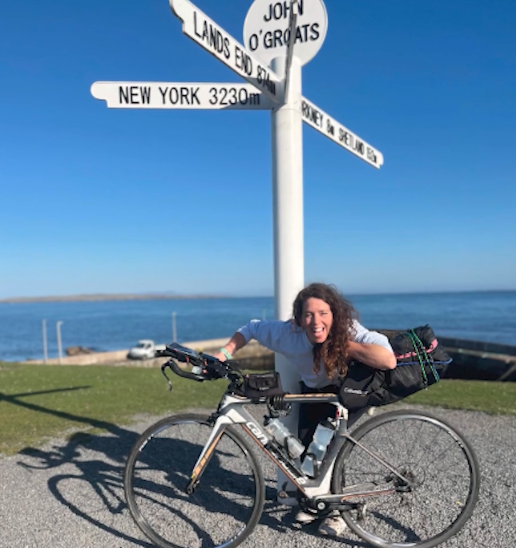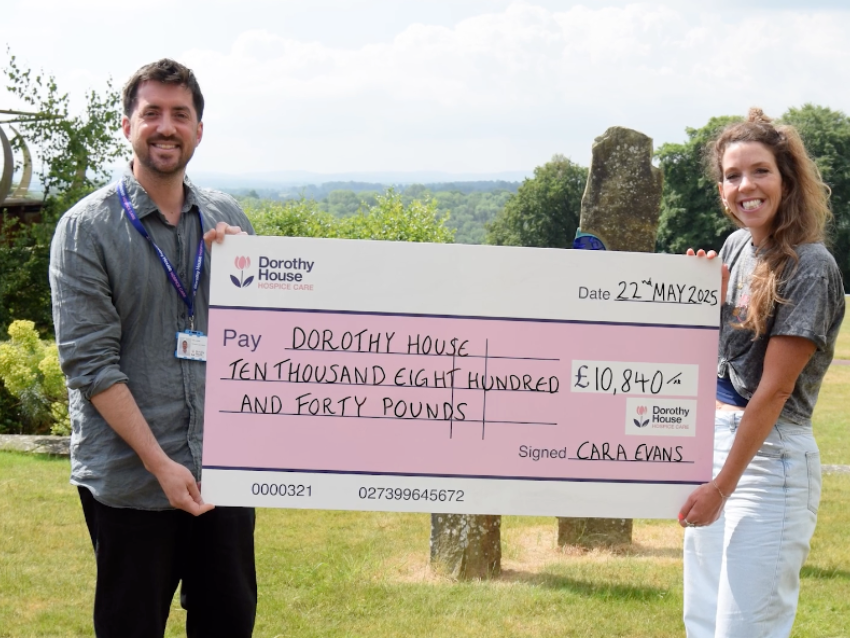Giving back to Dorothy House – Cara’s story
Cara’s cycling challenge
I decided to cycle from John O'Groats to Land's End as a way of giving back to Dorothy House. I did it on my own, just me and my bike. I don't know why I wanted to do it the other way around. It just seemed like a good idea. I quite fancied the idea of ending in Cornwall, because I thought maybe I could get a surf at the end!
I'm glad I did it that way round because it started with all the beautiful mountains. I did find out that people usually do it because there's a tailwind from Land's End, whereas I had a headwind all the way down. But it was amazing. I met so many wonderful people. Just stopping to get a coffee, people would donate and I spread the word about the challenge as I went.
And it really gathered momentum. So many people got on board and were sending supportive messages and people from my work. It blew me away. I wanted to raise a pound a mile, and it raised something like 100! It was a really physically demanding challenge and I was finding that when I was doing something super active, I was feeling at my best.
My lovely friend Ash drove me all the way to John O’Groats from Bath, which was so incredibly kind of her. We swam in Loch Ness on the way there, it was amazing.

Cara’s cancer journey
I think I have had to come to terms with dying a few times really, because the first time round I was told that it was stage four and actually started palliative chemo. And then I was told that there was no active disease on a scan after having the chemo stopped because the side effects had got too much. So that was a real shock. And then I had to go back to work. Fitting back into life was really challenging. It's been very character building, I would say I've had to learn to be very resilient. As I had come to terms with dying the first time around I think it's easier the second time round.
I had a theory the first time round that you should have a life that you love so much you can't bear to lose it. And so that led to changes when they said I was okay again. I now live on a houseboat, which I absolutely adore. I'm in nature all the time. I've made changes to just try to listen to what makes me happy and prioritise that which I think often when you're well, seems like a luxury and like you're being selfish. I've really prioritised fitness, eating healthily, spending time with family, trying to reduce my stress, making changes that I can. I always love a challenge. I'm always brewing up some scheme; I love a goal. So that's another reason that I did the bike ride. To have something to work towards that was positive.
in terms of understanding that I'm going to die prematurely, presumably, even if I outlive the prognosis, which I have every intention of doing, it's still very unlikely that I will have a full life expectancy. And in view of that, I've had to make decisions where I've weighed up the treatment option that was presented to me by the doctors was another six rounds of chemo, and it was just so physically tough.
Physically, probably I could have coped with it, but mentally it does feel a little bit like you're poisoning yourself. And I think if it's with curative intent, absolutely. I know how amazing chemo can be, but with a palliative hope that it may or may not help, I felt that I would much rather use my time feeling well. I'm in an unusual position because it's even though it's palliative, I don't currently have that many symptoms. At the moment when I'm feeling physically well, I just feel really reluctant to give up my strength because I feel as though my strength and vitality is really the most important thing to me.
I'm very comfortable that whenever the end comes, at whatever point in my life it is or how soon it is, I'll be comfortable that I made the decisions that I felt were right for me and my family. I would rather the girls saw me looking and feeling well and doing the things that make me happy and spending time with them for a shorter amount of time than fade away.
How Dorothy House has supported Cara
To know that Dorothy House is here is a constant comfort. I have had the lovely Sam and Donna come to visit me on my boat, which they loved!
I've got ten- and fifteen-year-old daughters who are coping remarkably well with the situation. But it’s an unusual situation and they don't know any other children who have are in a similar position. Donna was saying that Dorothy House has family days and groups for teenagers, so I'm hoping the girls are going to be able to come in and meet some other young people who are in a similar boat.
I think for me personally to feel comfortable that I'm going to be able to die peacefully, one concern is obviously physical. No one wants to feel sick, in pain or short of breath or any of the things that happen when you when you come to the end of your life. To know that I can physically die well is a real comfort. But also, I know that at Dorothy House you go above and beyond, that your care doesn't just end when you die. The services carry on, so my girls will continue to be supported and have a place to speak to people. All I want is to know that when I'm not here, they will be okay.

Hospice funding challenges
I don't think people realize what a difficult time hospices are going through. It blew my mind when I learned that it costs £56,000 pounds a day to run Dorothy House. And what became so apparent, and I think the reason it was so easy to raise such a large amount of money in such a short amount of time, is there is nobody on my Instagram feed or that I work with, or anybody in this area who hasn't had a loved one who's been supported by Dorothy House.
People absolutely adore this charity and I think it's a comfort for everybody that you guys are here. People seemed happy to have an opportunity to donate to Dorothy House in memory of somebody that they love that's been cared for here.
Embracing mortality
I think it's been a really positive experience actually. It's like, oh my God, I need to really prioritise, making every day count. Then I think, but everyone's in the same boat because you never know if the world is going to end tomorrow and it doesn't. Whether you've got a terminal illness or not, it's a bit of a leveller. And sometimes it's a bit of a struggle. I feel like I've lost the plot.
I've had conversations with friends thinking about where I would want to die. Of course Dorothy House is a real part of that. I'd probably happily die on the boat, but my mum wouldn't be able to come. She'd just be so seasick it's not really a possibility.
When you have children, they will remember how and where you died. And to have somewhere that is a beautiful, neutral place like this where there are no other associations. If I was to die on the boat, then I would worry that that would tarnish the girl's memory of the boat.
But to know that somewhere like this is here, is really comforting because it's set up to be that that that special, beautiful place. And to make dying as pleasant as it can be. Because I think it can be pleasant. I think you could be ready if you think about it and I think I feel prepared. I think I've had long enough. I was almost prepared the first time I was told I was going to die. This time I think I'm mentally very ready, but I feel like my body is nowhere near dying yet. When it does happen, I'll be ready. But in the meantime, I'm going to try and keep as fit as I can and do as much as I can to make sure that places like Dorothy House get the funding that they need.
I have this analogy that I think I always do life at a sprint, and I feel as though someone's told me that there's a cliff edge coming and you can't really fight that the cliff edge is there, but either you can slow down to a walk and it takes a bit longer to get there, but you're still going to drop off the cliff for a walk. I think I would rather just keep sprinting, and if I'm going off the edge, I'm going to go a sprint and that's the decision that I've made and I'm happy with that. I feel like I'll always be confident in that decision right to the end, because to me it's about quality, not quantity.
I’ve felt grief about the diagnosis. And when I've got bad news, I felt in a state of grief. But it's a temporary state. And then you go into mourning; I have mourned as part of coming to terms with dying, though I'm usually a very optimistic person. I find it quite difficult to go through in my head ‘what if I'm not here for that situation in the future’, but I almost intentionally try to think about those things. I might not be here for my children's weddings. But I find it useful to think about it because if that's the situation, I don't want to get to the end of my life and then suddenly have to rush through all these thoughts and feel like I'm not ready. I would rather prepare myself and prepare them for the fact that I might not be there, but I have every faith that they will be okay without me.
I've grieved for the situation and I've grieved the peace of mind. I think once you have a diagnosis of cancer, you never really relax ever again, it's always in the back of your mind. So even when you're having a happy moment, it kind of hangs over you. It's almost like a friend that's always by. You can think, you can make friends with grief and your situation and almost lean into it, rather than feeling in denial of it.